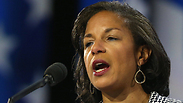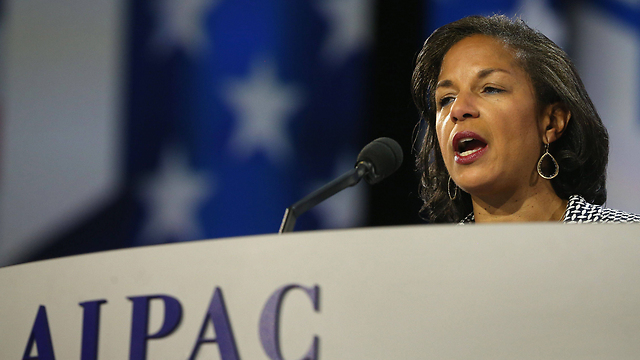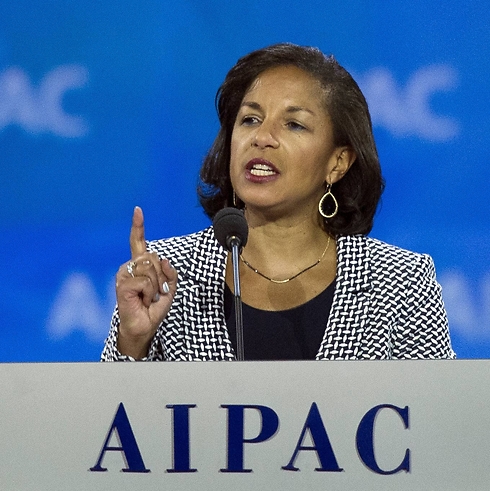
Rice at AIPAC: Soundbites won't stop Iran
Obama's national security adviser addresses pro-Israel lobby and says US-Israel ties transcend relations between 'individual leaders and political parties' but indirectly hits Netanyahu over Iran, saying 'bad deal better than no deal.'
(WASHINGTON) - President Barack Obama's national security adviser said a bad nuclear deal with Iran is worse than no deal at all and seemed to level criticism at Prime Minister Benjamin Netanyahu, saying "sound bites won’t stop Iran from getting a nuclear weapon, strong diplomacy backed by pressure can."
Her remarks came ahead of a speech to Congress on Tuesday by Netanyahu, who is expected to argue against US President Barack Obama's Iran strategy in a joint session of the US Congress which has brought tensions between the two leaders to record high.
Rice, who had previously said Netanyahu's speech to Congress was "destructive" to US-Israel-ties, spoke to the annual meeting of the pro-Israel lobby AIPAC and attempted to play down the fiery rhetoric that preceded Netanyahu's US visit.
Related stories:
- Netanyahu: US-Israel ties stronger than ever
- Op-ed: Netanyahu's colossal failure as prime minister
- Mossed chief: 'Netanyahu has caused Israel the most strategic damage on Iran'
"The relationship between the United States and the state of Israel is not a partnership between individual leaders and political parties, it’s an alliance between two nations rooted in the unbreakable friendship between our two peoples,” she said during her speech. “It is not negotiable, and it never will be.”
Regarding Iran, modifying a quote used by President Ronald Reagan, Rice says the US approach to Iran was "distrust, but verify" and said any US deal must verifiably cut off any pathway for Iran to develop a nuclear weapon.
Rice peppered her remarks to AIPAC with frequent phrases in Hebrew, and despite applause from the audience at the idea, Rice said it was impossible to completely prevent Iran from developing nuclear energy, a prospect which leaves the Islamic republic poised to develop nuclear arms, saying it was not "a viable negotiating position."
“As desirable as that would be, it is neither realistic nor achievable,” she said in reference to Iran's insistence on its right to enrich uranium – a massive sticking point both in talks between world powers and Iran, and between Jerusalem and Washington.
In another veiled jabbed at Netanyahu, Rice rejected Netanyahu's longstanding position that 'no deal' was preferable to a 'bad deal', saying the opposite and adding: "We cannot let an unachievable ideal stand in the way of a good deal."
"I know some may argue that we must impose sanctions and walk away… But, my friends, let’s remember that sanctions, unfortunately, have never stopped Iran from advancing its program," Rice said.
"Here’s what’s likely to happen without a deal: Iran will install and operate advanced centrifuges," Rice said, adding that "It will rebuild its uranium stockpile and we will lose the unprecedented sanctions and transparency we have today."
Tense ties, unbreakable bond
Obama on Monday appeared to wave off any prospect the bedrock US alliance with Israel might be ruined by the rancor.
"I don't think it's permanently destructive," Obama told Reuters in an interview. "I think that it is a distraction from what should be our focus. And our focus should be, 'How do we stop Iran from getting a nuclear weapon?'"
Netanyahu, who has played up his security credentials ahead of a closely contested March 17 election in Israel, has denied his speech would have any design other than national survival.
"I plan to speak about an Iranian regime that is threatening to destroy Israel," he told AIPAC on Monday. "The last thing that I would want is for Israel to become a partisan issue, and I regret that some people have misperceived my visit here this week as doing that."
He did not elaborate on the speech's content. One aide said Netanyahu would inform U.S. lawmakers of details on the nuclear talks in hope they would question the administration and thus defer a March-end target date for a framework deal with Iran.
Israel believed members of Congress "do not necessarily know the details of the deal coming together, which we do not see as a good deal," the aide told reporters on condition of anonymity.
Netanyahu wants the Iranians stripped of nuclear projects that might be used to get a bomb - something Tehran insists it does not want. Washington deems the Israeli demand unrealistic.
A deal with Iran is far from guaranteed, given US assessments that more than a decade of carrot-and-stick diplomacy with Iran might again fail to clinch a final accord.
"I would say that it's probably still more likely than not that Iran doesn't get to yes," Obama told Reuters. "It is more likely that we could get a deal now than perhaps three or five months ago. But there are still some big gaps that have to be filled."
AP and Reuters contributed to this report













